Complete Solutions to QUESTIONS AND ANSWERS of chapter HEREDITY AND EVOLUTION of Class 10 book with complete answers and questions
| Class 10 | BIOLOGY |
| Chapter | HEREDITY AND EVOLUTION |
| KUMAR PRAKASHAN | QUESTIONS AND ANSWERS |
| Number Of Questions | 69 |
| Academic Year | 2023-24 |
How does reproduction link to variation ?
View SolutionExplain creation of diversity over succeeding generation.
View SolutionIf a trait A exists in `10%` of a population of an asexually reproducing species and a trait B exists in `60%` of the same population, which trait is likely to have arisen earlier ?
View SolutionHow does the creation of variations in a species promote survival ?
View SolutionWhich is the most obvious outcome of reproduction ? What does the rules of heredity determine ?
View SolutionWhat is the meaning of similarities and differences ?
View SolutionTo suggest rule for inheritance of earlobe type. Procedure /Method :
`rarr` The lowest part of the ear pinna called the earlobe, is closely attached to the side of the head, i.e., attached or not, i.e., free.
`rarr` Observe the earlobes of all the students in the class. Prepare a list of students. Enter the data about the earlobes whether they are free or attached.
`rarr` Find out about the earlobes of the parents of each student in the class.
`rarr` Correlate earlobe type of each student with that of their parents.
`rarr` In the column write F for free earlobe and A for attached earlobe.
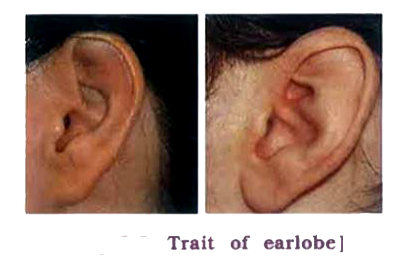
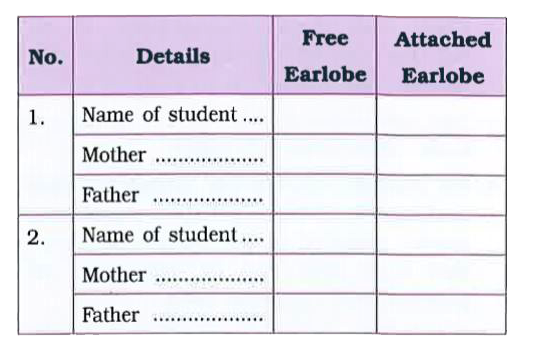
Answer the following questions on the basis of the collected data:
Which expression of earlobe is observed more in number in your class?
View SolutionTo suggest rule for inheritance of earlobe type. Procedure /Method :
`rarr` The lowest part of the ear pinna called the earlobe, is closely attached to the side of the head, i.e., attached or not, i.e., free.
`rarr` Observe the earlobes of all the students in the class. Prepare a list of students. Enter the data about the earlobes whether they are free or attached.
`rarr` Find out about the earlobes of the parents of each student in the class.
`rarr` Correlate earlobe type of each student with that of their parents.
`rarr` In the column write F for free earlobe and A for attached earlobe.
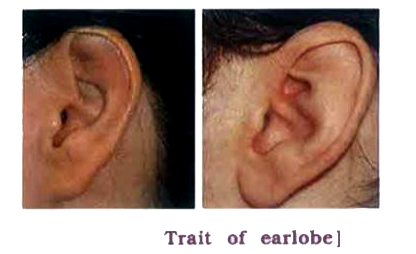
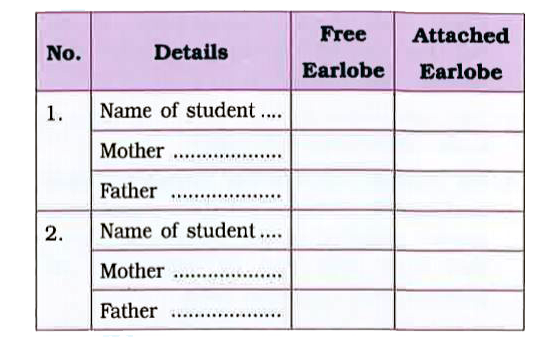
Answer the following questions on the basis of the collected data:
Are the types of earlobes hereditary?
View SolutionTo suggest rule for inheritance of earlobe type. Procedure /Method :
`rarr` The lowest part of the ear pinna called the earlobe, is closely attached to the side of the head, i.e., attached or not, i.e., free.
`rarr` Observe the earlobes of all the students in the class. Prepare a list of students. Enter the data about the earlobes whether they are free or attached.
`rarr` Find out about the earlobes of the parents of each student in the class.
`rarr` Correlate earlobe type of each student with that of their parents.
`rarr` In the column write F for free earlobe and A for attached earlobe.
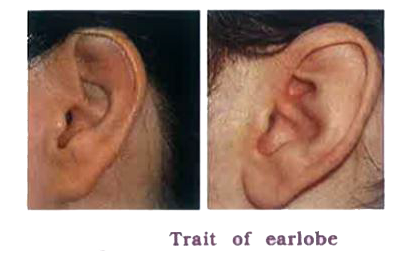
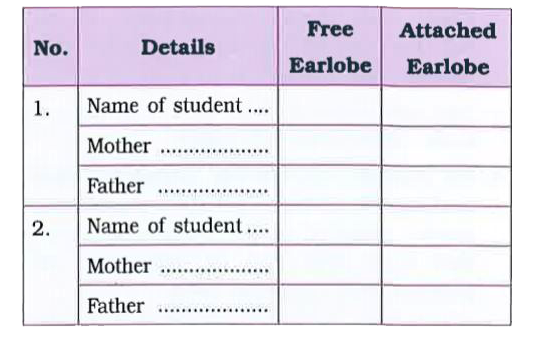
Answer the following questions on the basis of the collected data:
From your collected data state which expression is dominant and which one is recessive for earlobe.
View SolutionTo suggest rule for inheritance of earlobe type. Procedure /Method :
`rarr` The lowest part of the ear pinna called the earlobe, is closely attached to the side of the head, i.e., attached or not, i.e., free.
`rarr` Observe the earlobes of all the students in the class. Prepare a list of students. Enter the data about the earlobes whether they are free or attached.
`rarr` Find out about the earlobes of the parents of each student in the class.
`rarr` Correlate earlobe type of each student with that of their parents.
`rarr` In the column write F for free earlobe and A for attached earlobe.
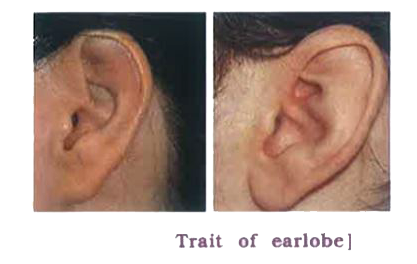
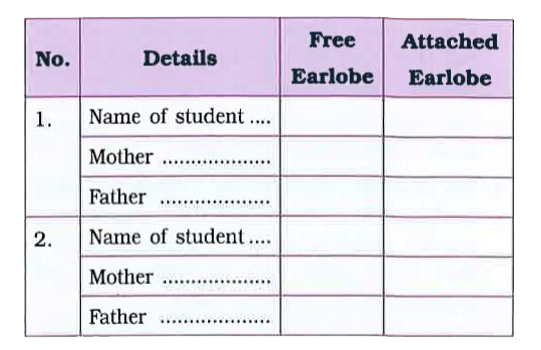
Answer the following questions on the basis of the collected data:
Determine the percentage of free earlobe and attached earlobe in the students of your classroom.
View SolutionState the basic features of inheritance of traits.
View SolutionWhy there are two versions for each trait in each child ? What trait will be seen in the child from these two versions ?
View SolutionThe gene ‘T’ for the character of tallness in pea plant is dominant and gene ‘t’ is recessive. Explain it on the basis of Mendel’s experiment.
View SolutionExplain the inheritance of any one character in two successive generations.
View SolutionWhen pea plants showing pair of two different characteristics are bred with each other.
`{:("Characters","Different characteristics"),("1. Height of Plant","Tall and short"),("2. Shape of seed","Round and wrinkled"):}`
Answer the following questions :
What do the progeny of cross made between tall plant with round seeds and a short plant with wrinkled seeds look-like ?
View SolutionWhen pea plants showing pair of two different characteristics are bred with each other.
`{:("Characters","Different characteristics"),("1. Height of Plant","Tall and short"),("2. Shape of seed","Round and wrinkled"):}`
Answer the following questions :
Which traits are dominant ?
View SolutionWhen pea plants showing pair of two different characteristics are bred with each other.
`{:("Characters","Different characteristics"),("1. Height of Plant","Tall and short"),("2. Shape of seed","Round and wrinkled"):}`
Answer the following questions :
What happens when `F_(1)` progeny are used to generate `F_(2)` progeny by self-pollination ?
View SolutionExplain the inheritance of shape and colour of the seed of pea plant (Pisum sativum).
View SolutionExplain the independent inheritance of two separate characters in pea plant on the basis of Mendel's experiment.
View SolutionHow do proteins control the characteristics ? Explain with suitable example.
View SolutionHow are traits controlled by genes ?
View SolutionWhich mechanism of inheritance is used by all sexually reproducing organisms ?
View SolutionHow does the mechanism of heredity work ?
View SolutionWhat is sex determination? State the different methods of sex determination in animals.
View SolutionDescribe sex determination in the human beings.
View SolutionHow do Mendel's experiments show that traits may be dominant or recessive ?
View SolutionHow do Mendel's experiments show that traits are inherited independently ?
View SolutionA man with blood group A marries a woman with blood group O and their daughter has blood group O. Is this information enough to tell you which of the traits blood group A or O is dominant ? Why or why not ?
View SolutionDescribe sex determination in the human beings.
View SolutionWhat is responsible for inbuilt tendency to variation ?
View SolutionExplain natural selection with suitable example.
View SolutionNatural selection is directing evolution in the beetle population. Explain in detail.
View SolutionWhat is genetic drift ? How genetic drift provides diversity without any adaptation ?
View SolutionExplain the idea of evolution with the help of inherited variations in a beetle population.
View SolutionExplain how availability of food leads to variation in beetle population ? Is it inherited or not ? Why?
View SolutionWrite short note on :
Acquired characteristics/traits
View SolutionWrite short note on :
Hereditary characteristics
View SolutionExplain the process of origin of life as given by different scientists.
View SolutionWhat are the different ways in which individuals with a particular trait may increase in a population ?
View SolutionWhy are traits acquired during the life-time of an individual not inherited ?
View SolutionWhy are the small numbers of cause of worry from the surviving tigers a point of view of genetics ?
View SolutionWhat is speciation ? Explain how speciation occurs.
View SolutionExplain the mechanism of speciation.
View SolutionWhat factors could lead to the rise of a new species ?
View SolutionWill geographical isolation be a major factor in the speciation of a self-pollinating plant species ? Why or why not ?
View SolutionWill geographical isolation be a major factor in the speciation of an organism that reproduce asexually ? Why or why not ?
View SolutionExplain classification of organisms on the basis of Evolution.
View SolutionWe can built up the evolutionary relationships of species by identifying hierarchies of characteristics between them. Explain.
View SolutionIn what way homologous organs provide evidence for evolution ?
View SolutionExplain the importance of homologous organs in the process of evolution.
View SolutionWrite short note : Analogous organs
View SolutionWhat are fossils ? How do they form ? Give example of various kind of fossils ? How do we know how old the fossils are ?
View SolutionHow do fossils form layer by layer ?
View SolutionExplain evolution by stages through the example of eye.
View SolutionWrite a short note on: Evolution of eye
View SolutionWrite a short note on : Evolution of feathers
View SolutionExplain evolution from wild cabbage using the artificial selection.
View SolutionHow and which different varieties of cabbage are developed from the wild variety of cabbage by the farmers?
View SolutionWhich method is extensively used to define evolutionary relationships ?
View SolutionExplain in short : Molecular phylogeny
View SolutionGive an example of characteristics being used to determine how close two species are in evolutionary terms.
View SolutionCan the wing of a butterfly and the wing of a bat be considered homologous organs ? Why or why not ?
View SolutionWhat are fossils ? What do they tell us about the process of evolution ?
View SolutionWhich things do we need to remember in an exercise of tracing the family trees of species ?
View SolutionExplain the idea of evolution.
View SolutionExplain the evolution of human beings.
View SolutionWhich information have been obtained from the study of human evolution ?
View SolutionWhy are human beings who look so different from each other in terms of size, colour and looks said to belong to the same species ?
View SolutionIn evolutionary terms, can we say which among bacteria, spiders, fish and chimpanzees have a better body design ? Why or why not ?
View Solution
QUESTIONS AND ANSWERS questions and complete solutions for chapter HEREDITY AND EVOLUTION of KUMAR PRAKASHAN of Class 10
All Exercises from KUMAR PRAKASHAN Class 10 BIOLOGY HEREDITY AND EVOLUTION
- ADDITIONAL QUESTIONS AND ANSWERS
- OBJECTIVE QUESTIONS AND ANSWERS
- OBJECTIVE QUESTIONS AND ANSWERS (Answer as directed : (Miscellaneous))
- OBJECTIVE QUESTIONS AND ANSWERS (Answer the following questions in short : )
- OBJECTIVE QUESTIONS AND ANSWERS (Fill in the blanks: )
- OBJECTIVE QUESTIONS AND ANSWERS (Graph-diagram based questions : )
- OBJECTIVE QUESTIONS AND ANSWERS (Select the correct alternative from those given below each question: )
- OBJECTIVE QUESTIONS AND ANSWERS (State whether the following statements are true or false : )
- PRACTICAL SKILL BASED QUESTIONS WITH ANSWERS
- QUESTIONS AND ANSWERS
- TEXTUAL EXERCISE
- VALUE BASED QUESTIONS WITH ANSWERS